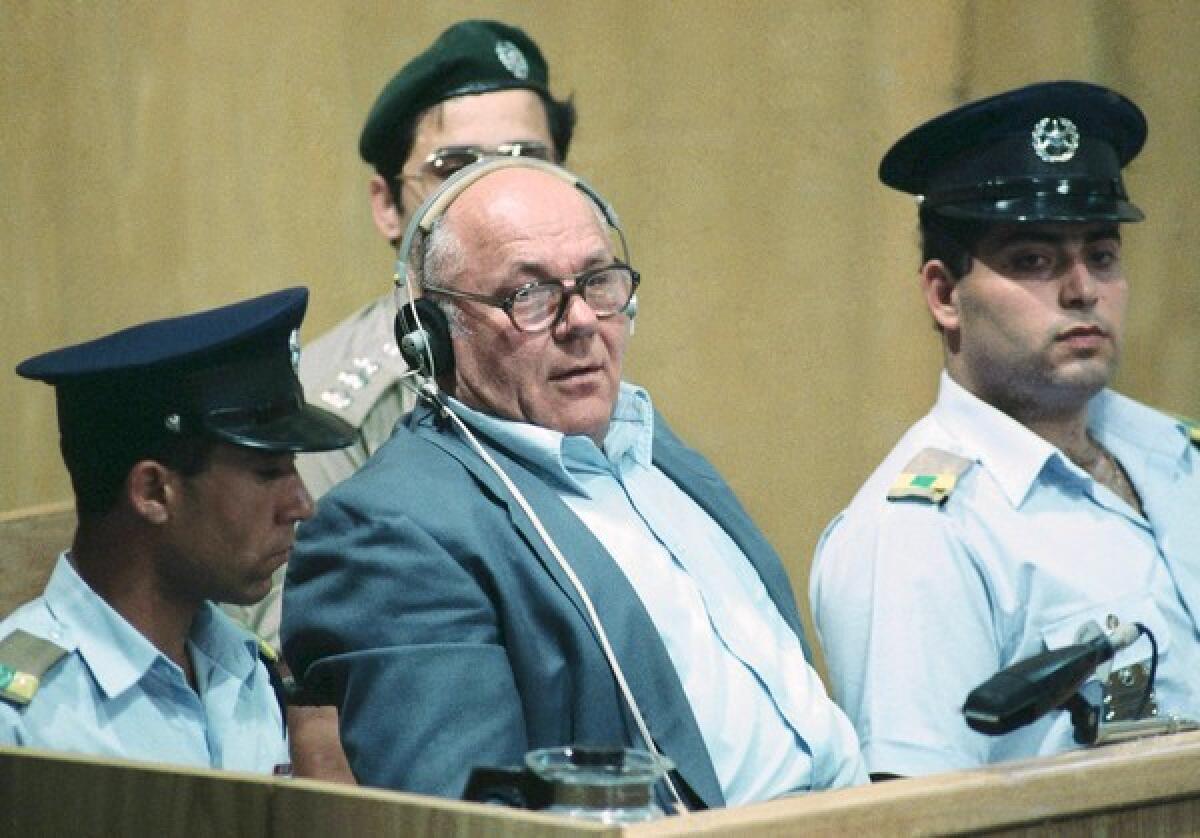John Demjanjuk dies at 91; convicted Nazi death camp guard

- Share via
Reporting from London -- John Demjanjuk, a retired Ohio autoworker convicted of serving as a guard at a Nazi extermination camp and being complicit in the deaths of more than 28,000 people, died Saturday in Germany. He was 91.
Demjanjuk died in a nursing home in southern Germany as a prisoner of failing health but not of the justice system that found him guilty last year of being an accessory to mass murder. A German judge had sentenced him to five years behind bars, but he was allowed his freedom while he launched an appeal.
Until the end, the Ukrainian-born Demjanjuk (pronounced dehm-YAHN-yook) and his family maintained his innocence of the monstrous crimes of which he stood accused. They contended that he was the victim of mistaken identity, a former Soviet soldier who was wounded in action in World War II, then held captive by the Nazis before eventually being freed and immigrating to the United States.
But based on an old identity card that experts said proved he turned guard at the infamous Sobibor death camp, Demjanjuk was found guilty last May in a Munich court of 28,060 counts of being an accessory to murder. The conviction was unprecedented, since it came purely on the grounds that he had served as a guard rather than tying him to a specific killing.
His son, John Demjanjuk Jr., who lives in Ohio, confirmed his father’s death of natural causes to the Associated Press. The elder Demjanjuk had suffered from terminal bone marrow disease and other illnesses.
“He loved life, family and humanity,” John Demjanjuk Jr. told the Associated Press. “History will show Germany used him as a scapegoat to blame helpless Ukrainian POWs for the deeds of Nazi Germans.”
Demjanjuk first shot to notoriety as an accused Nazi henchman in 1977, when information passed to U.S. officials suggested that he was, in fact, “Ivan the Terrible,” a sadistic sentry who ran the gas chambers at the Treblinka extermination camp in German-occupied Poland, where an estimated 800,000 prisoners were put to death. The U.S. stripped Demjanjuk of his citizenship and ordered him extradited to Israel to stand trial for war crimes and crimes against humanity.
The 1987 trial was the first of its kind since that of infamous Nazi war criminal Adolf Eichmann in 1961. Broadcast on Israeli radio and television, the proceedings stretched out over 18 months and featured emotional testimony from Holocaust survivors who identified Demjanjuk as Ivan the Terrible. Forensic experts confirmed as genuine the ID card, unearthed in Soviet archives, attesting to his service as a Nazi guard.
Demjanjuk was found guilty and sentenced to death in April 1988. But five years later, the Israeli Supreme Court overturned the verdict on appeal, declaring that new evidence threw sufficient doubt on whether Demjanjuk was, in fact, Ivan the Terrible.
Although the high court did not absolve Demjanjuk of having served as a Nazi guard, it decided that to try him again would subject him to double jeopardy, prohibited by Israeli law, and ordered him returned to the U.S. in 1993. His citizenship was reinstated in 1998 after a federal appeals court in Washington ruled that prosecutors had deliberately suppressed evidence related to whether he was Ivan the Terrible.
But evidence continued to mount that Demjanjuk had served as a guard at the Nazis’ Majdanek and Sobibor camps, among others, and that he had concealed the information when he moved to the United States. His American citizenship was revoked once again in 2002, and, in May 2009, despite his declining health and advanced age, he was deported to Germany to face charges there. The trial began four months later.
Before a panel of judges, Demjanjuk insisted that he was “again and again an innocent victim of the Germans,” blaming the country for snatching away his family, his happiness and his future. He tried to cast doubt on the damning ID card, suggesting that it was a forgery.
Unswayed, the panel convicted him last May, saying there was clear evidence that while he was a prisoner of war Demjanjuk volunteered to serve with the notorious S.S. and participated in the Nazi killing machine that slaughtered 6 million Jews and other “undesirables” such as Gypsies and homosexuals. Specifically, the judges said Demjanjuk had served as a guard at Sobibor between March and September of 1943.
He was in his early 20s then, having been born on April 3, 1920, in the central Ukrainian village of Dubovi Makharintsi, before the country was absorbed into the Soviet Union and subjected to dictator Josef Stalin’s brutal rule.
Demjanjuk was a farm worker before he was drafted into the Soviet Red Army. After being wounded in action, he returned to the front lines, but fell into enemy hands during the battle of Kerch Peninsula in the Crimea in May 1942.
After the war ended, Demjanjuk was interned at a camp for displaced people, where he met and married his wife. Claiming to be a Sobibor-area farmer, he immigrated to the United States in 1952, settled in a Cleveland suburb and landed a job as a mechanic at aFord Motor Co.plant in the area. He and his wife, Vera, had a son, John Jr., and two daughters, Irene and Lydia, who survive him.
Even after his conviction in Germany last year, the family fought to have Demjanjuk’s U.S. citizenship reinstated so he could return to Ohio. But his requests were denied, most recently in January.
More to Read
Start your day right
Sign up for Essential California for the L.A. Times biggest news, features and recommendations in your inbox six days a week.
You may occasionally receive promotional content from the Los Angeles Times.







